新视野大学英语第三版第一册Unit 6教案
- 格式:docx
- 大小:18.57 KB
- 文档页数:5
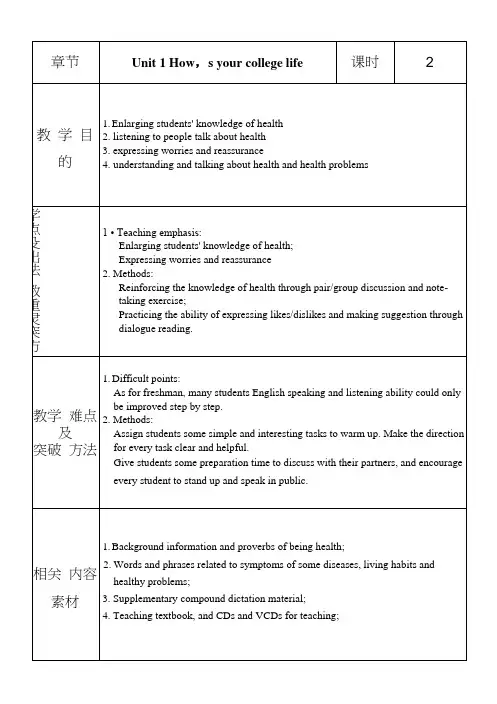
章节Unit 1 How,s your college life课时2教学目的1.Enlarging students' knowledge of health2.listening to people talk about health3.expressing worries and reassurance4.understanding and talking about health and health problems学点殳出法教重灵突方1 • Teaching emphasis:Enlarging students' knowledge of health;Expressing worries and reassurance2. Methods:Reinforcing the knowledge of health through pair/group discussion and note-taking exercise;Practicing the ability of expressing likes/dislikes and making suggestion through dialogue reading.教学难点及突破方法1.Difficult points:As for freshman, many students English speaking and listening ability could only be improved step by step.2.Methods:Assign students some simple and interesting tasks to warm up. Make the direction for every task clear and helpful.Give students some preparation time to discuss with their partners, and encourage every student to stand up and speak in public.相关内容素材1.Background information and proverbs of being health;2.Words and phrases related to symptoms of some diseases, living habits and healthy problems;3.Supplementary compound dictation material;4.Teaching textbook, and CDs and VCDs for teaching;Procedures Activities PurposeTopic Understanding 1.Activity 1Work in groups, choose either one of the followingquestion to discuss and then share your answers withthe whole class.1 ・ Do you often see a doctor? Why yes or why not?2.What's your understanding of “an apple a daykeeps the doctor away99?2. Activity 2brainstormingWork in groups of four, search your brains forsome sayings, proverbs concerning health as many aspossible, the group who can work out most wordswill win the game!1.Health is not valued till sickness comes・2.Health is not simply the absence of sickness3.Property may be destroyed and money may loseits purchasing power; but, character, health,knowledge and good judgment will always be indemand under all conditions・一First, to check the result ofthe students^ preview ofthis units and arouse theirinterests;Second, to activate theirbackground information onhealth;Third, to make them formthe habits of thinking thetopic critically;Finally, through groupwork, they can learnt tocooperate with theirclassmate and practice theirspoken English・Listening Focus 1・ Strategy AnalysisCompound-dictation:Listen to the passage talking about health, and fill inthe blanks:If you are a young lady in your 20s,you may either1or wonderingwhich diet to follow・ Now it has the same meaningas 2 • Very often voumeet young girls who look weak enough to 3 in thewind, yet they are still talking about diets! However,extreme diets can lead to4• Many such dietersmay end up with serious5. Prince DianaThrough doing thiscompound dictation, twomain purposes may beachieved:First: the students can learnand practice on how to takenotes;Second: explain someimportant words andexpressions about health・These sometimes are thedifficult points for them tounderstand thelistening material.For the culture tips here, Iconsider it plays a vital rolein college students‘ Englishlearning ・ For6an excessively strong appetite; Karen Carpenter, apopular singer of the 1970s,died of loss of appetite.You should know that looking good is important butnot when it comes 7your health or your life. Better eating habits and proper exercise are all you need to be fit and look good ・2. Additional PracticeDebate:Divide the whole class into two big groups, and ask one group to stand for the positive side, and the other group the negative side to debate on the topic: Should we diet in order to keep fit?3・ Language TipsCulture tips: Princess DianaDiana, Princess of Wales (1 July 1961-31 August 1997) was the first wife of The Prince Charles, Prince of Wales. From her marriage in 1981 to her divorce in 1996 she was styled Her Royal Highness, The Princess of Wales. Though she was noted for her pioneering charity work, the Princesses philanthropic (博爱A 勺) endeavors were overshadowed by a scandal-plagued marriage.Tn 1987, when so many still believed that AIDS could be contracted through casual contact, Princess Diana sat on the sickbed of a man with AIDS and held his hand・ She showed the world that people with AIDS deserved not isolation, but compassion. It helped change world opinion, helped give hope to people with AIDS, and helped save lives of people at risk?----- Bill Clinton learning a language, to some degree, is to understand the culture transferred by the language itself. So this part is to arise students9 senses of culture.Speaking Workshop L Strategy AnalysisGroup-work:How many expressions do you know aboutexpressing worries?About oneselfIt makes me uneasy.By finishing thegroup-work of findingexpressions they knowabout expressing womes,Students can:First recall the knowledgeFm worried. It worries me.Fm worried/concerned about... r can't help worrying... Fm afraid... About othersAre you all righl/any better/felling better? What ,wrong/ the matter/ the problem? Is anything wrong? Is it serious?What 5s on your mind?Fm sure things will turn out fine. You cion I have to worried about that.Therereally no reason to be worried. There^s nothing to worry about. Cheer up.Your condition is not as bad as all that. Nothing to worry about. I quite understand. Pull yourself togethe 匚2. Additional PracticeRole-play:Work in pairs to make dialogues according to the following situations.Situation 1: Lisa's heartbeat is somewhat irregular, she is very worried and wonders whether to drop her jogging class, for her grandma died of a heart attack. The doctor tells her not to be so nervous and advises her not to take strenuous exercises but continue with her jogging class.Situation 2: Stephanie is worried about her interview on Friday for a part-time job. Robert tells her not to be worried, for there are many openings in the school bulledn. He sympathizes with her and asks her to be confident of herself. 3. Language Tips1. It makes me uneasy/it worries me: they are the expressions we sometimes use toexpress worries about ourselves. On the other hand, when we worried about others, we say:what's on your mind?2. I wouldn't worry/I wouldn^t be concerned: reassure ourselves ・Dorf l be concerned/you don^t have to worry aboutthey^ve previewed and then reinforce their impressions on them; second, they can enhance their abilities of speaking and communicating with their group members; In addition, they can learn how to express theirconcerns upon both others and themselves ・that: reassure others3.No need to get so worked up: tell someone not to be so worried.“worked up" means very excited and showing strong feelings, especially when we worried"cheer up,,urge someone to be happy/encourage someone in an activity.4.Pull yourself together: control your own feelings.。
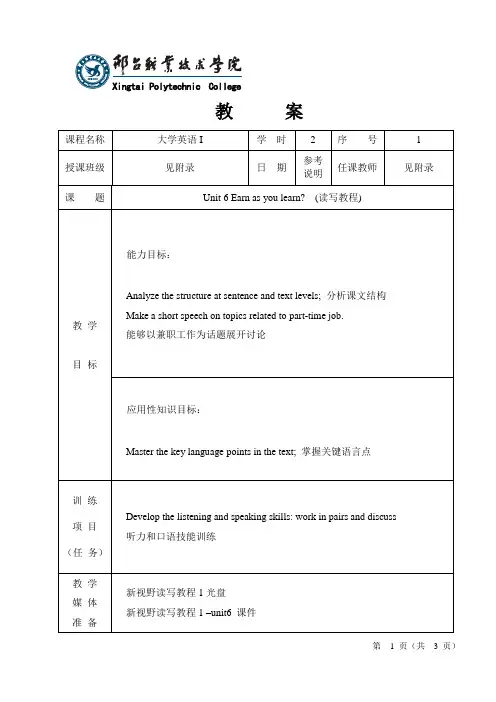
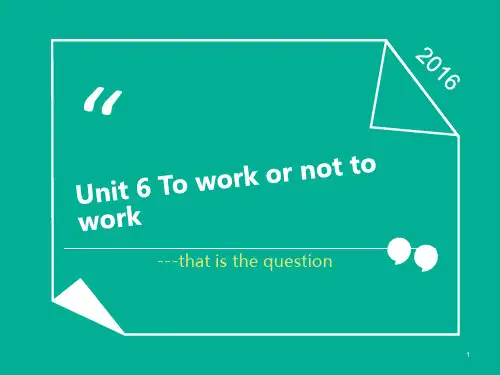
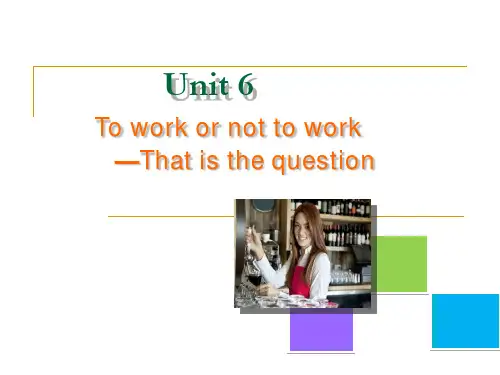
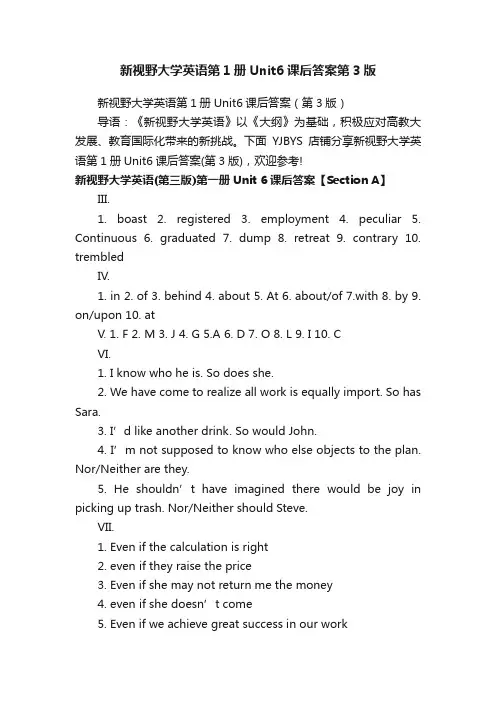
新视野大学英语第1册Unit6课后答案第3版新视野大学英语第1册Unit6课后答案(第3版)导语:《新视野大学英语》以《大纲》为基础,积极应对高教大发展、教育国际化带来的新挑战。
下面YJBYS店铺分享新视野大学英语第1册Unit6课后答案(第3版),欢迎参考!新视野大学英语(第三版)第一册Unit 6课后答案【Section A】III.1. boast2. registered3. employment4. peculiar5. Continuous6. graduated7. dump8. retreat9. contrary 10. trembledIV.1. in2. of3. behind4. about5. At6. about/of7.with8. by9. on/upon 10. atV. 1. F 2. M 3. J 4. G 5.A 6. D 7. O 8. L 9. I 10. CVI.1. I know who he is. So does she.2. We have come to realize all work is equally import. So has Sara.3. I’d like another drink. So would John.4. I’m not supposed to know who else objects to the plan. Nor/Neither are they.5. He shouldn’t have imagined there would be joy in picking up trash. Nor/Neither should Steve.VII.1. Even if the calculation is right2. even if they raise the price3. Even if she may not return me the money4. even if she doesn’t come5. Even if we achieve great success in our workVIII.1. The police got to the station five minutes after the explosion, and so did the reporters.2. Even if you disagree with her, she is worth listening to.3. The news reporters were given nothing but bare facts by the officials in charge of the investigation.4. The room was well decorated, but the color of the curtain did not go well with the overall style.5. Whenever we go back to the place where my husband was born, we always make the rounds of his relatives.6. Contrary to his hope, his girlfriend’s parents are not as approachable as his parents.IX.1. 我问过好几个服务员,可他们什么也没说,只朝着我笑,直到这时我才意识到我的英语不够好。
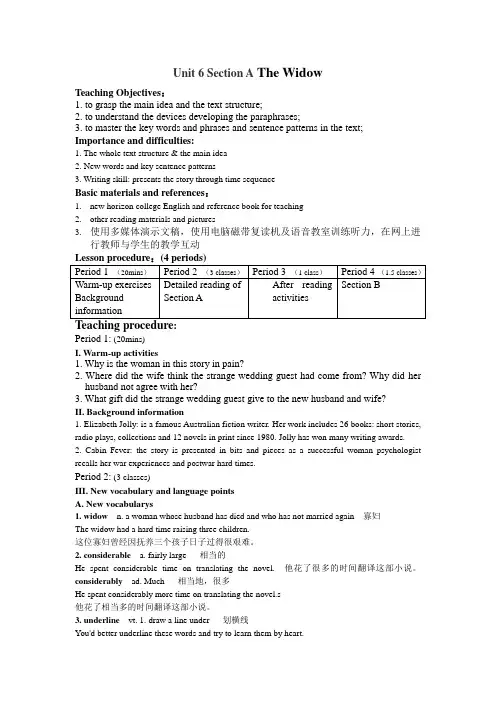
Unit 6 Section A The WidowTeaching Objectives:1. to grasp the main idea and the text structure;2. to understand the devices developing the paraphrases;3. to master the key words and phrases and sentence patterns in the text; Importance and difficulties:1. The whole text structure & the main idea2. New words and key sentence patterns3. Writing skill: presents the story through time sequenceBasic materials and references:1.new horizon college English and reference book for teaching2.other reading materials and pictures3.使用多媒体演示文稿,使用电脑磁带复读机及语音教室训练听力,在网上进行教师与学生的教学互动:Period 1: (20mins)I. Warm-up activities1. Why is the woman in this story in pain?2. Where did the wife think the strange wedding guest had come from? Why did her husband not agree with her?3. What gift did the strange wedding guest give to the new husband and wife?II. Background information1. Elizabeth Jolly: is a famous Australian fiction writer. Her work includes 26 books: short stories, radio plays, collections and 12 novels in print since 1980. Jolly has won many writing awards.2. Cabin Fever: the story is presented in bits and pieces as a successful woman psychologist recalls her war experiences and postwar hard times.Period 2: (3 classes)III. New vocabulary and language pointsA. New vocabularys1. widow n. a woman whose husband has died and who has not married again 寡妇The widow had a hard time raising three children.这位寡妇曾经因抚养三个孩子日子过得很艰难。
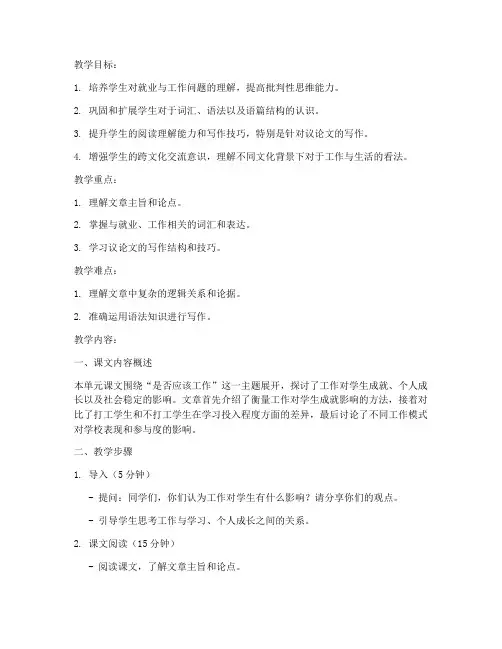
教学目标:1. 培养学生对就业与工作问题的理解,提高批判性思维能力。
2. 巩固和扩展学生对于词汇、语法以及语篇结构的认识。
3. 提升学生的阅读理解能力和写作技巧,特别是针对议论文的写作。
4. 增强学生的跨文化交流意识,理解不同文化背景下对于工作与生活的看法。
教学重点:1. 理解文章主旨和论点。
2. 掌握与就业、工作相关的词汇和表达。
3. 学习议论文的写作结构和技巧。
教学难点:1. 理解文章中复杂的逻辑关系和论据。
2. 准确运用语法知识进行写作。
教学内容:一、课文内容概述本单元课文围绕“是否应该工作”这一主题展开,探讨了工作对学生成就、个人成长以及社会稳定的影响。
文章首先介绍了衡量工作对学生成就影响的方法,接着对比了打工学生和不打工学生在学习投入程度方面的差异,最后讨论了不同工作模式对学校表现和参与度的影响。
二、教学步骤1. 导入(5分钟)- 提问:同学们,你们认为工作对学生有什么影响?请分享你们的观点。
- 引导学生思考工作与学习、个人成长之间的关系。
2. 课文阅读(15分钟)- 阅读课文,了解文章主旨和论点。
- 针对文章中的生词和难句进行讲解。
3. 讨论与分析(15分钟)- 分组讨论:根据文章内容,分析工作对学生成就的影响。
- 学生分享讨论成果,教师点评并总结。
4. 词汇学习(10分钟)- 学习与就业、工作相关的词汇和表达,如:employment, achievement, commitment, stability等。
- 通过例句和练习,巩固词汇。
5. 语法讲解(10分钟)- 讲解与议论文写作相关的语法知识,如:复合句、并列句等。
- 通过例句和练习,巩固语法知识。
6. 写作指导(10分钟)- 分析议论文的写作结构和技巧。
- 学生根据所学内容,撰写一篇关于“是否应该工作”的短文。
7. 课堂小结(5分钟)- 总结本节课的重点内容,强调议论文写作的注意事项。
三、课后作业1. 阅读相关材料,了解不同文化背景下对于工作与生活的看法。
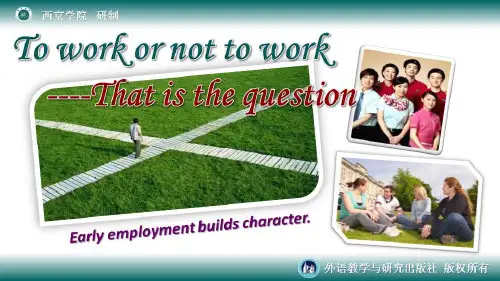
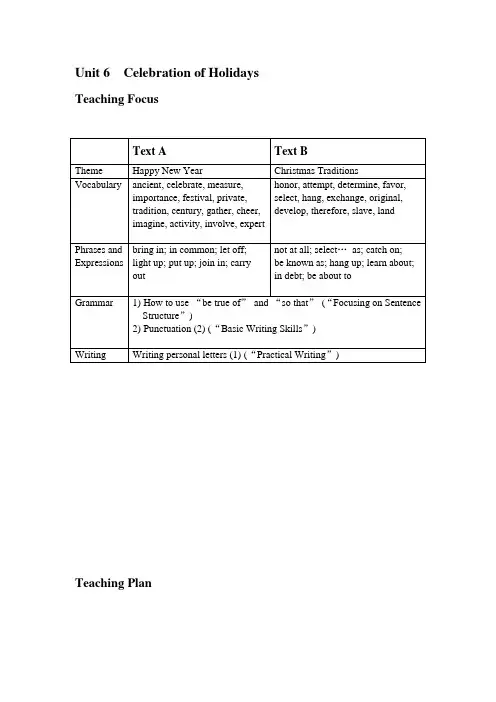
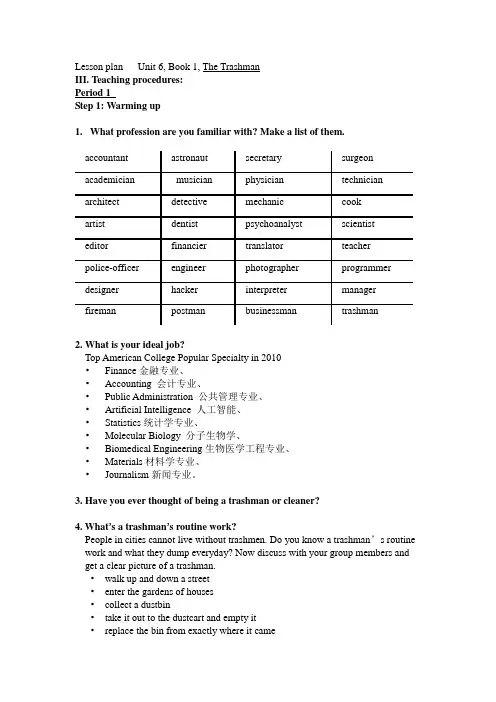
Lesson plan Unit 6, Book 1, The TrashmanIII. Teaching procedures:Period 1Step 1: Warming up1.What profession are you familiar with? Make a list of them.2.What is your ideal job?Top American College Popular Specialty in 2010•Finance金融专业、•Accounting 会计专业、•Public Administration 公共管理专业、•Artificial Intelligence 人工智能、•Statistics统计学专业、•Molecular Biology 分子生物学、•Biomedical Engineering生物医学工程专业、•Materials材料学专业、•Journalism新闻专业。
3. Have you ever thought of being a trashman or cleaner?4. What’s a trashman’s routine work?People in cities cannot live without trashmen. Do you know a trashman’s routine work and what they dump everyday? Now discuss with your group members and get a clear picture of a trashman.•walk up and down a street•enter the gardens of houses•collect a dustbin•take it out to the dustcart and empty it•replace the bin from exactly where it came•normally suffer from being looked down upon5. What do trashman dump?Garbage:The by-products of animal or vegetable foodstuffs, resulting from the handling or preparation of food or other matter which is subject to decomposition (变质), decay (腐败), putrefaction (腐败), or the generation of noxious (有毒的), oroffensive gases and odors (气味).Litter:Litter is misplaced, not containerized, man-made or used solid waste. Litter is alsoa dirty, ugly, costly mess!Household Trash:paperdustragsbottlesdiscarded toyssmall appliancescansYard Trash:It includes leaves, grass trimmings, shrubbery trimming.Yard Bulky Household Trash:Any waste accumulation of bulky items such as stoves, refrigerators, washers, dryers, water heaters, sofas, box springs, carpets and similar items.Step 2 Words and Expressions1. continuous a. happening or existing without stopping.e.g. The brain needs a continuous supply of blood大脑需要不断供血.Compare:continual: actions which are repeated over a period of time.continuous: things and events which continue without stoppinge.g. Stop continual hammeringThe trees formed a continuous line on the horizon.The plane landed after flying continuously for 16 hours.2. tremble vt. shake slightlytremble with …e.g. He trembled with anger.His hand was trembling as he picked up his pen to sign.His voice trembled with emotion.3. register vt. 1) put one’s name on a liste.g. Parents have to register the birth of their kid. 父母要为孩子做出生登记。
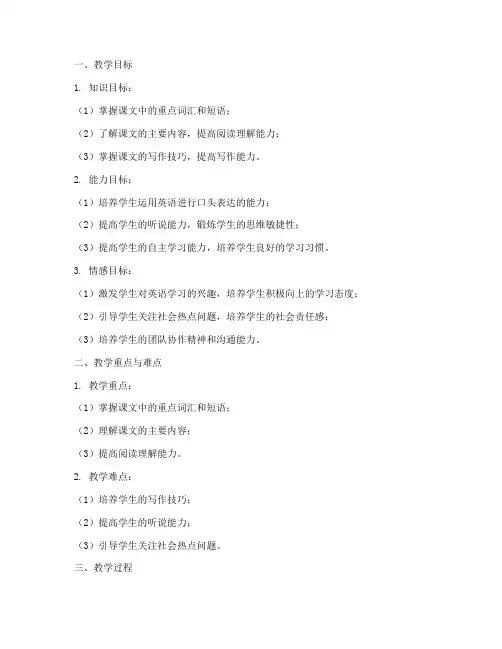
一、教学目标1. 知识目标:(1)掌握课文中的重点词汇和短语;(2)了解课文的主要内容,提高阅读理解能力;(3)掌握课文的写作技巧,提高写作能力。
2. 能力目标:(1)培养学生运用英语进行口头表达的能力;(2)提高学生的听说能力,锻炼学生的思维敏捷性;(3)提高学生的自主学习能力,培养学生良好的学习习惯。
3. 情感目标:(1)激发学生对英语学习的兴趣,培养学生积极向上的学习态度;(2)引导学生关注社会热点问题,培养学生的社会责任感;(3)培养学生的团队协作精神和沟通能力。
二、教学重点与难点1. 教学重点:(1)掌握课文中的重点词汇和短语;(2)理解课文的主要内容;(3)提高阅读理解能力。
2. 教学难点:(1)培养学生的写作技巧;(2)提高学生的听说能力;(3)引导学生关注社会热点问题。
三、教学过程1. 导入新课(1)展示与课文相关的社会热点图片,激发学生的兴趣;(2)简要介绍课文背景,让学生对课文内容有所了解。
2. 预习课文(1)学生快速阅读课文,了解课文大意;(2)教师提问,检查学生对课文内容的掌握情况。
3. 词汇学习(1)讲解课文中的重点词汇和短语,如:irrational behavior、emotions、ignorance等;(2)让学生用这些词汇和短语造句,加深对词汇的理解。
4. 阅读理解(1)分析课文结构,讲解阅读技巧;(2)让学生分小组讨论课文中的问题,提高阅读理解能力;(3)教师总结讨论结果,纠正学生的错误。
5. 写作训练(1)讲解写作技巧,如:如何组织文章结构、如何运用过渡词等;(2)让学生根据课文内容,写一篇短文,锻炼写作能力。
6. 听说训练(1)播放与课文相关的听力材料,让学生听后回答问题;(2)组织学生进行角色扮演,提高口语表达能力。
7. 课堂小结(1)回顾本节课所学内容,巩固所学知识;(2)布置课后作业,巩固所学知识。
四、教学反思1. 关注学生的个体差异,因材施教;2. 营造轻松、愉快的课堂氛围,激发学生的学习兴趣;3. 注重培养学生的自主学习能力,提高学生的综合素质。
Unit 6, Book OneSection A: To work or not to work- That is the question1. Teaching Objectives:To talk about the effects of part-time employmentTo further understand the textTo apply the phrases and patternsTo master the paragraph writing skill2.Time Allotment:Section A (3 periods):1st---2nd period: Pre-reading activities ( theme-related questions for warming up;)While-reading activities (cultural notes; useful words and expressions;difficult sentences)3rd period: While-reading activities (text structure; main ideas)Post-reading activities (comprehension questions; exercises) Section B(1period):4th periods: Practice of the reading skill (reading for the key idea in a sentence);T checks on Ss’ home reading by asking questions based on the passage.T explains some difficult sentences3.Teaching Procedures:Pre-reading ActivitiesStep 1. GreetingsGreet the whole class warmly.Step 2. Lead-in and preparation for readingLet them talk to each other about the following questions:1. Why do some students like to take part-time jobs?2. What problems will students face with when they take part-time jobs?3. What suggestions will you put forward toward students planning to work part-time?Step 3. Fast readingAsk the Students to read the passage as quickly as they can and then answerthe questions on the screen. Let them get the main idea of each paragraph and make clear about the text structure.Text structure: ( structured writing ) The passage can be divided into 3 parts.Part1 (para.1) Research methodsPart 2 (para2-4) Research findingsPart 3 (Para.5-8) Explanations for the negative effectsPart 4 (Para.9) Conclusion of the researchPurpose: Improve the students’ reading and writing ability and understand the general idea of each paragraph.Method:Read the text individually and talk in groups; Use task-based language teaching method, reading approach, communicative approach and total physical response method.Step 4. Preparation for details of the text on the screenStudents are required to look at the Words and Phrases on the screen and give a brief presentation in class.Words and Phrases:Purpose: Train the Students’ ability of understandi ng and using foreign language.Method:Talk in groups, Use task-based language teaching method, communicative approach and total physical response method.1. (Para.1) contrast with与…形成对比;和…相对照The experts also contrasted smokers with non-smokers, on different indicators of their commitment to conduct.专家们还对比了吸烟者和不吸烟者在行动力投入程度方面的不同指征。
新视野大学英语读写教程第一册Unit6教案有效,包括课前准备,课时安排,当堂活动,作业设计等Unit 6 : The Power of NatureⅠ. Pre-class PreparationTeacher’s Activities:1. Clarify the aims of this unit.2. Overview the text structure and the main points of this text.3. Introduce some related background knowledge.4. Briefly introduce some language points.Student’s Activities:1. Review the last lesson or the text if necessary.2. Think about the aims of this unit.3. Try to predict the contents of this text.Ⅱ. While-class ActivitiesTeacher’s Activities:1. Finish introducing the language points.2. Lead-in:Show some pictures about the power of nature and let students talk about the power of nature in small groups.3. Ask questions and check their understanding of the text.4. Lead-out:Teach some new words in this text with students.Student’s Activities:1. Listen to the teacher carefully and try to understand the language points.2. Talk about the related topics in small groups.3. Discuss the questions with their partners or groups.4. Learn the new words and be able to use them in theirdaily life.Ⅲ. Post-class ActivitiesTeacher’s Activities:1. Assign the homework.2. Summarize the key points of this lesson.Student’s Activities:1. Read the text again and try to find some more information about the power of nature.2. Write an essay about the power of nature.3. Review the language points and try to find more related knowledge.Ⅳ. Homework1. Read this text again and try to find more related information.2. Write an essay about the power of nature and share it with other students.3. Review the new words and try to use them in your daily life.。
新视野大学英语(第三版)Unit6-单词讲解New wordsUnit 6 TEXT Anumerousa.many 许多的;很多的The library has numerous books, more than I have ever expected. 这个图书馆拥有大量的图书,比我预想的要多得多。
reliablea.able to be trusted or depended on 可信赖的;可靠的A reliable employee does his/her job with minimal error. 一个可靠的员工工作起来错误最少。
contrastvt.compare two things, ideas, people, etc. to show how different they are from each other 使成对比;使成对照In her essay, the author contrasts the present economic crisis with the one 10 years ago. 作者在文中就当前的经济危机和十年前的经济危机进行了对比。
vi.(of two things) be different from each other, often in a noticeable or interesting way 形成对比Her dark hair contrasted sharply with her pale silk gown. 她的黑头发和她的浅色丝绸礼服形成了强烈的对比。
n.[C, U] a difference between people, ideas, situations, things, etc. that are being compared 差异;差别The book presents a very interesting contrast between life now and life 100 years ago. 这本书把现在的生活和100 年之前的生活进行了十分有趣的对比。
新视野大学英语第3版第1册Unit6课后答案新视野大学英语第3版第1册Unit6课后答案导语:《新视野大学英语》充分考虑了外语教学的主、客体需求,积极进行了教学手段的改革。
下面YJBYS店铺提供新视野大学英语第3版第1册Unit6课后答案,欢迎参考!新视野大学英语(第3版)第一册Unit6课后答案【Section A】Comprehension of the TextI.1. She didn’t like her first name because it didn’t suit her good looks and elegant manner, and it made her think she should be a cook.2. She felt more comfortable with herself and other people started to take her more seriously.3. the writer thi nks that the name change didn’t cause Debbie’s professional achievement, but it surely helped by making her feel more self-confident about her talents.4. The writer thought that his name, Joe, made him seem more qualified to be a baseball player than an art critic. He also believed that if he had a more refined name, like Arthur or Adrian, his name would appear complete.5. The woman felt ill at ease because the attractive man, whom she wanted the writer to introduce her to, was the same person whom she had once turned down due to his dull-sounding name.6. We often project name-based stereotypes onto people. For example, one of the writer’s women friends confessed that while taking charge of a group of four-year-olds at the nursery school, she became confused by their personalities because of their names.7. One study showed that teachers gave lower grades to essays written by boys with less appealing names than they awarded to the same papers by boys with better-sounding names.8. If you are determined enough, you can change your name.VocabularyIII.1. confessed2. reserve3. professional4. impressive5. latter6. convey7. qualify8. refined9. substitute 10. approvalIV.1. Correct form: fill out; synonym: fill in2. Correct form: feel comfortable with; synonym: feel comfortable about3. Correct form: attach first importance to; translation: 非常重视; 把……放在第一位4. Correct form: turned down; synonym: rejected; refused5. Correct form: came (up) to; definition: moved toward6. Correct form: pressing me for; definition: try in a determined way to get something.7. Correct form: free from/of; definition: not influenced by8. Correct form: stuck with; translation: 不得不接待; 被迫接待9. Correct form: for better or worse; definition: whether the result is good or bad10. Correct form: took charge of; synonym: took responsibility forV.1. M2. K3. L4. F5. I6. C7. H8. O9. E 10. BWordBuildingVI.illegal impolite irregular impatient incapableirresponsible inconsistent inappropriate incorrect indefinite1. impatient2. irresponsible3. inconsistent4. illegal5. inappropriate6. incapable7. irregular8. impolite9. incorrect 10. indefiniteVII.unnoticeable unreasonable ungrateful unlimited uncertain uncover unrecognizable unfashionable undo untidy unfold unload1. unreasonable2. unfolded3. uncertain4. uncovered5. ungrateful6. unloading7. unlimited8.undidSentence structureVIII.1. so is air to man2. so is the eagle of all birds3. so is beer to the British4. so is tea to the Chinese5. so do the English love their beerIX.1. While waiting at the doctor’s, I read an entire short story.2. After using the brush, put it in its proper place.3. Before being in the army, he was an engineer.4. I deliberately didn’t read the book before going to see the film.5. When buying a new car, it is best to seek expert advice.TranslationX.1. (Just) as a machine needs regular running, so does the body need regular exercise.2. He learned to play the piano while studying in the United States.3. To our disappointment, he turned down our invitation.4. The reality is that, for better or worse, the world has changed with advance of new technologies.5. Most of the female students in my class appear to be ill at ease when (they are) required to answer questions.6. The local government took charge of the security for the sports meeting.XI.1. 足球之于意大利人,就像乒乓球之于中国人。
Unit 6, Book OneSection A: To work or not to work- That is the question1. Teaching Objectives:To talk about the effects of part-time employmentTo further understand the textTo apply the phrases and patternsTo master the paragraph writing skill2.Time Allotment:Section A (3 periods):1st---2nd period: Pre-reading activities ( theme-related questions for warming up;)While-reading activities (cultural notes; useful words and expressions;difficult sentences)3rd period: While-reading activities (text structure; main ideas)Post-reading activities (comprehension questions; exercises)Section B(1period):4th periods: Practice of the reading skill (reading for the key idea in a sentence);T checks on Ss’ home reading by asking questions based on the passage.T explains some difficult sentences3.Teaching Procedures:Pre-reading ActivitiesStep 1. GreetingsGreet the whole class warmly.Step 2. Lead-in and preparation for readingLet them talk to each other about the following questions:1. Why do some students like to take part-time jobs?2. What problems will students face with when they take part-time jobs?3. What suggestions will you put forward toward students planning to work part-time? Step 3. Fast readingAsk the Students to read the passage as quickly as they can and then answer the questions on the screen. Let them get the main idea of each paragraph and make clear about the text structure.Text structure: ( structured writing ) The passage can be divided into 3 parts.Part1 (para.1)Research methodsPart 2 (para2-4) Research findingsPart 3 (Para.5-8)Explanations for the negative effectsPart 4 (Para.9)Conclusion of the researchPurpose: Improve the students’ reading and writing ability and understand the general idea of each paragraph.Method:Read the text individually and talk in groups; Use task-based language teaching method, reading approach, communicative approach and total physical response method.Step 4. Preparation for details of the text on the screenStudents are required to look at the Words and Phrases on the screen and give a brief presentation in class.Words and Phrases:Purpose: Train the Students’ ability of understanding and using foreign language.Method:Talk in groups, Use task-based language teaching method, communicative approach and total physical response method.1. (Para.1) contrast with与…形成对比;和…相对照The experts also contrasted smokers with non-smokers, on different indicators of their commitment to conduct.专家们还对比了吸烟者和不吸烟者在行动力投入程度方面的不同指征。
2. (Para.2) interfere with妨碍;阻止Sharpening the axe will not interfere with the cutting of firewood.磨刀不误砍柴工。
3. (Para.3) take a / its toll on对…产生不良影响The difficult curriculum, and fierce competition have taken a serious toll on students’ physical and mental health.高难度的课程和激烈的竞争严重影响了这些学生的身心健康。
4. (Para.4)cut back on削减;缩减Experts suggest that as the concentration of PM2.5 in the air exceeds 200, the general population should cut back on the social and recreational activities.专家建议当大气中的可入肺颗粒物浓度超过200时,一般人群最好减少外出社交和娱乐活动。
5. (Para.7)drop out退学;辍学;退出;脱离We should help those students who have dropped out of school because of poverty, enabling them to return to school.我们应该帮助那些由于贫困而失学的学生,使他们重返学校。
6. (Para.8) be accustomed to doing sth.习惯于做某事Love is mutual, which needs to pay, also wants to harvest. We, as parents, please do not be blindly accustomed to paying for our children.爱是相互的,它需要付出,也要去收获。
作为家长的我们,千万不要一味习惯为孩子付出爱。
7. (Para.9) contribute to促成,造成(某事发生)Animal fats and sugar contribute to a weight problem and can be a factor in heart disease.动物脂肪和糖会导致体重增加,而且可能是引起心脏病的一个因素。
8. (Para.9) hold on to继续感到;仍然相信Thousands of miles apart, we met with quarrels, and sometimes even a cold war, but we still hold on to love.我们相隔千里,有争吵,也有冷战,但我们依然相信爱情。
Step 5: While-reading ActivitiesLanguage Points:1. There are numerous and reliable ways by which one can measure the impact of employment on student achievement, and we used several in our research (Para. 1)Meaning: There are many reliable methods to study how work affects students’ school performance, and we used a few of the methods in our research.2. We have simplified and classified the data and the results are clear: The stakes are high. (Para. 2)Meaning: We have processed the data by making them simpler and grouping them into different categories. The research results are clear: The risks for working students are high.3. On the other hand, we also detected a different pattern. Working for approximately 10 hours per week or less seemingly does not take a consistent toll on school performance. (Para. 3) Meaning: However, we also found out a different pattern, that is, when students work for about 10 hours or less every week, it does not seem to have a continuous bad effect on students’ school performance.4. In other words, over time, the more students work, the less committed to school they become. (Para. 4)Meaning: That is to say, as students work longer hours, they gradually become less devoted to study.5. Over time, as these become established practices, students’ commitment to school is eroded bit by bit. (Para. 5)Meaning: Gradually, as these practices of cutting corners have been in use for a long time, students become less and less committed to school.Step 6: Typical patterns:Purpose:Further understand the text (Train further reading ability)to find out some difficult sentences and details of the text.Method:Read the text together; Use task-based language teaching method, reading approach, communicative approach, grammar-translation approach and total physical response method.Typical patterns:1. Nevertheless, given that half of all employed seniors, about one-third of all juniors, and about one-fifth of all second-year students work above the 20-hour limit, indications are that a large number of students are at risk of compromising their school careers with their part-time jobs. (Para.3, L3)不过,鉴于一半的大四打工学生、约三分之一的大三打工学生、以及五分之一的大二打工学生的打工时间都超过20小时的上限,因此种种迹象表明,有众多学生面临因打零工而危及学业的风险。